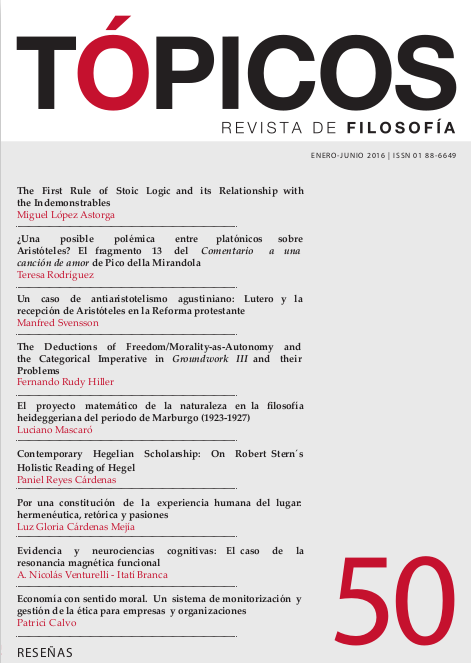Artículos
Un caso de antiaristotelismo agustiniano: Lutero y la recepción de Aristóteles en la Reforma protestante
Publicado 2015-12-20
Palabras clave
- Aristóteles,
- Lutero,
- Melanchthon,
- agustinismo tardomedieval
Cómo citar
Svensson, M. (2015). Un caso de antiaristotelismo agustiniano: Lutero y la recepción de Aristóteles en la Reforma protestante. Tópicos, Revista De Filosofía, 50, 41-59. https://doi.org/10.21555/top.v0i50.720
Resumen
Considerando la variedad de críticas a Aristóteles que se encuentra entre autores de la modernidad temprana, el artículo pregunta por la existencia de una crítica característicamente protestante. Las objeciones de Lutero son así explicadas como una variante reformacional de un tipo de crítica a Aristóteles común en el agustinismo tardomedieval. Finalmente, se evalúa los efectos de esta posición en Melanchthon.
Referencias
- Bagchi, D. (1991). Luther’s Earliest Opponents: Catholic Controversialists 1518-1525. Minneapolis: Fortress.
- Cleveland, Ch. (2013). Thomism in John Owen. Farnham: Ashgate.
- Dieter, Th. (2001). Der junge Luther und Aristoteles. Eine historisch- systematische Untersuchung zum Verhältnis von Theologie und Philosophie. Berlín y Nueva York: Walter de Gruyter.
- Düring, I. (1968). Von Aristoteles bis Leibniz. En Moraux, P. (Ed.) Aristoteles in der neueren Forschung. Darmstadt: Wissenschaftliche Buchgesellschaft.
- Dowdell, V. (1942). Aristotle in Anglican Religious Thought. Ithaca, NY: Cornell University Press.
- Frank, G. (1995). Die theologische Philosophie Philipp Melanchthons (1497-1560). Leipzig: Benno.
- Grabmann, M. (1936). Aristoteles im Werturteil des Mittelalters. En Mittelalterliches Geistesleben II. München: Max Hüber Verlag.
- Janz, D. (1989). Luther on Thomas Aquinas. The Angelic Doctor in the Thought of the Reformer. Stuttgart: Franz Steiner Verlag.
- Junghans, H. (1979). Die probationes zu den philosophischen Thesen der Heidelberger Disputation Luthers im Jahre 1518. En Luther Jahrbuch, 46, 10-59.
- Kuropka, N. (2002). Philip Melanchthon: Wissenschaft und Gesellschaft. Tübingen: Mohr Siebck, Tübingen.
- Lindberg, C. .(2009). The European Reformations. Oxford: Blackwell.
- Luther, M. (1883-). Werke. Weimarer Ausgabe. Weimar: Böhlau.
- Maurer, W. (1967). Der junge Melanchthon. Göttingen: Vandenhoeck & Ruprecht.
- McGrath, A. (2005). The Intellectual Origins of the European Reformation. Oxford: Blackwell.
- MacIntyre, A. (1984). After Virtue. Notre Dame: Notre Dame University Press.
- Melanchthon, Ph. (1834-1860). Opera quae supersunt Omnia en Corpus Reformatorum vols. 1-28. Brettschneider C. B., Bindseil, H. E. (Eds.) Halle-Braunschweig: C. A. Schwetschke.
- ____ (1951-1975). Melanchthons Werke in Auswahl. Stupperich, R. (Ed.) Stuttgart-Bad Cannsta : Gütersloher Verlagshaus Gerd Mohn.
- ____ (1997). Melanchthon Deutsch I. Leipzig: Evangelische Verlagsanstalt, Leipzig.
- Muller, R. (1987-2003). Post-Reformation Reformed Dogmatics 4 vols. Grand Rapids: Baker Academic.
- Oberman, H. (1989). Werden und Wertung der Reformation. Tübigen: Mohr Siebeck.
- Owen, J. (1850-1855). The Works of John Owen. Goold, W. (Ed.) Londres: Johnstone and Hunter.
- Petersen, P. (1921). Geschichte der aristotelischen Philosophie im protestantischen Deutschland Leipzig: Meiner Verlag.
- Pleizier, Th., Wisse, M. (2011). “As the Philosopher says”: Aristotle. En Introduction to Reformed Scholasticism. van Asselt, W. (Ed.) Grand Rapids: Reformation Heritage Books.
- Saak, E. (2013). The Augustinian Renaissance. Textual Scholarship and Religious Identity in the Later Middle Ages. En Oxford Guide to the Historical Reception of Augustine. Pollmann, K. (Ed.) vol. 1. Oxford: Oxford University Press.
- Scheible, H. (2010). Aufsä e zu Melanchthon. Tübingen: Mohr Siebeck.
- Schmitt, Ch. (2004). Aristóteles en el Renacimiento. León: Universidad de León, Secretariado de Publicaciones.
- Selderhuis, H. (2012). Die Heidelberger Artistenfakultät zur Zeit der Schüler Melanchthons. En Philosophie der Reformierten. Frank, G. y Selderhuis, H. (Eds.) Stuttgart-Bad Cannstatt: frommann-holzboog.
- Troeltsch, E. (2001). Die Bedeutung des Protestantismus für die Entstehung der modernen Welt, en E. Troeltsch, Kritische Gesamtausgabe vol. VIII. Berlín y Nueva York: Walter de Gruyter.
- Zumkeller, A. (1963). Die Augustinertheologen Simon Fidati von Cascia und Hugolin von Orvieto und Martin Luthers Kritik an Aristoteles. En Archiv für Reformationsgeschichte 1963 (54), pp. 15-37, especialmente 28-29.






